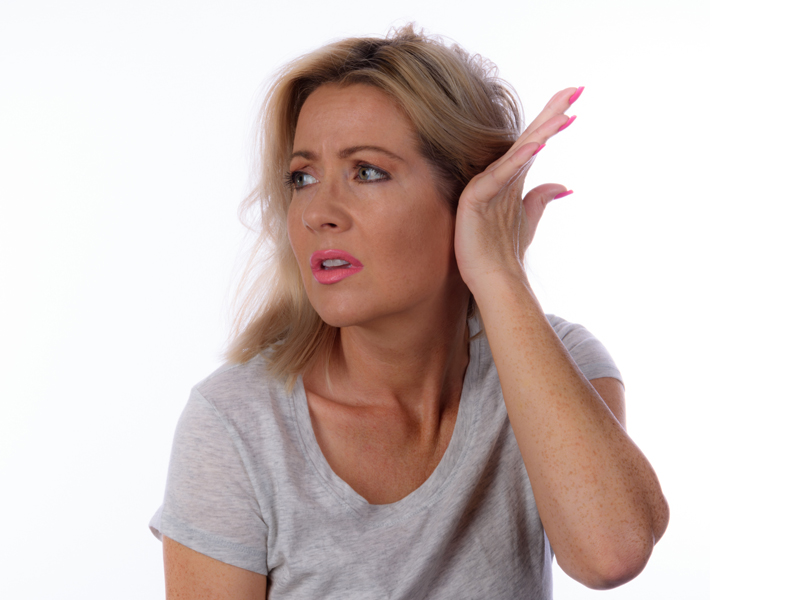Get Easy Health Digest™ in your inbox and don’t miss a thing when you subscribe today. Plus, get the free bonus report, Mother Nature’s Tips, Tricks and Remedies for Cholesterol, Blood Pressure & Blood Sugar as my way of saying welcome to the community!
7 odd symptoms that signal menopause (tinnitus, too?)

The word menopause literally means the ceasing of menstruation.
However, women commonly use this term to refer to the span of four to five years prior to this when the body is slowing its production of estrogen.
In reality, menopause is not a process. The word denotes that moment in time when menstruation stops. A woman has reached this point when she has not had a menstrual period for twelve consecutive months.
Peri-menopause is the term for that build-up to menopause, when periods may become irregular, signaling that the ovaries are slowing down.
On average, peri-menopause begins for women between forty and fifty-one years old. But genetics and other factors can cause some women to enter menopause as early as forty years old.
Hot flashes, mood swings and trouble sleeping are some of the nearly-universal symptoms of peri-menopause. Many a joke has been made about women wearing shorts and tank top in the dead of winter and feeling no pain… I know I was one of them! Here are 3 drug-free ways to control hot flashes and anxiety.
But there are other subtler signs your body may send that announce the arrival of peri-menopause. Knowing the reason for these menopause symptoms will relieve your anxiety.
It will also allow you to give your body the nutritional and lifestyle support that can help alleviate troublesome menopause symptoms…
7 surprising menopause symptoms
1. Ringing in the ears.
Higher progesterone levels toward the end of the monthly cycle can cause a temporary bout of tinnitus, or ringing in the ears. This could also be a swishing sound or pulsating rhythm, or may sound like humming, buzzing or crashing waves.
2. Heart palpitations.
This one, of course, may worry you. In perimenopause, palpitations are caused by increased production of follicle stimulating hormone (FSH) as your body tries to stimulate ovulation. If you’re uncertain or worried about heart palpitations, by all means, speak with your doctor.
3. Tingling in the extremities.
It’s harder for the body to absorb nutrients during this time, so you’re more open to deficiencies. Vitamin B-12 is a common one, and a deficiency can cause tingling in hands and feet.
Ironically, your risk of low B-12 levels increases when you take antacids to relieve the heartburn that often comes with perimenopause.
4. Clumsiness and bruising easily.
Perimenopausal women just seem to bump into things more. Maybe it’s ‘brain fog,’ but it seems to be a symptom all on its own. And of course, this leads to more bruising.
Changes in hormones make it easier to become bruised. Many women get undressed at the end of a day and find bruises they didn’t even know were there!
5. Dry mouth and eyes.
Changes in estrogen levels cause mucous membranes to become dry. Most women know about this because vaginal membranes are drier, making intercourse difficult.
But your eyes and mouth become dry as well. A lot of screen time will only make dry eyes feel worse.
6. Gum and teeth problems.
Unfortunately, there can be an increase of low-grade inflammation in the body during peri-menopause, and this can lead to inflamed and receding gums.
Another possible cause of dental problems is that declining levels of estrogen affect bone density, including the bones of your jaw that hold your teeth in place.
Related: 4 supplements that fight aging and gum disease
7. Urinary issues.
The loosening of internal structures, including the ligaments that hold up your uterus, may cause episodes of incontinence. The bladder becomes more sensitive.
You may even feel like you have a urinary tract infection, when you don’t. If in doubt, see your doctor. For a natural way to alleviate these menopause symptoms, try a bioidentical, plant-derived estrogen cream.
Diet can help
Because your body is going through all these changes, it needs your support in the form of good nutrition more than ever.
Important vitamins and minerals to focus on are calcium and Vitamin D for bones, Vitamin B-12 for nerve health, and omega-3 fatty acids. Sprinkle flaxseed on yogurt, cereal, oatmeal and salads, and bake it into breads. Not only is it rich in omega-3s, it balances hormones and reduces dry eyes.
Avoid alcohol, sugar and caffeine. Spicy foods can trigger hot flashes and aggravate urinary problems.
Editor’s note: Are you feeling unusually tired? You may think this is normal aging, but the problem could be your master hormone. When it’s not working, your risk of age-related diseases skyrockets. To reset what many call “the trigger for all disease” and live better, longer, click here to discover The Insulin Factor: How to Repair Your Body’s Master Controller and Conquer Chronic Disease!
Sources:
- Can you relieve menopause symptoms naturally -— without taking hormones? — Women’s Health Network
- The Optimal Menopause Diet — Everyday Health
- Menopause (Symptoms, Remedies, and Treatment Medications) — emedicinehealth.com













